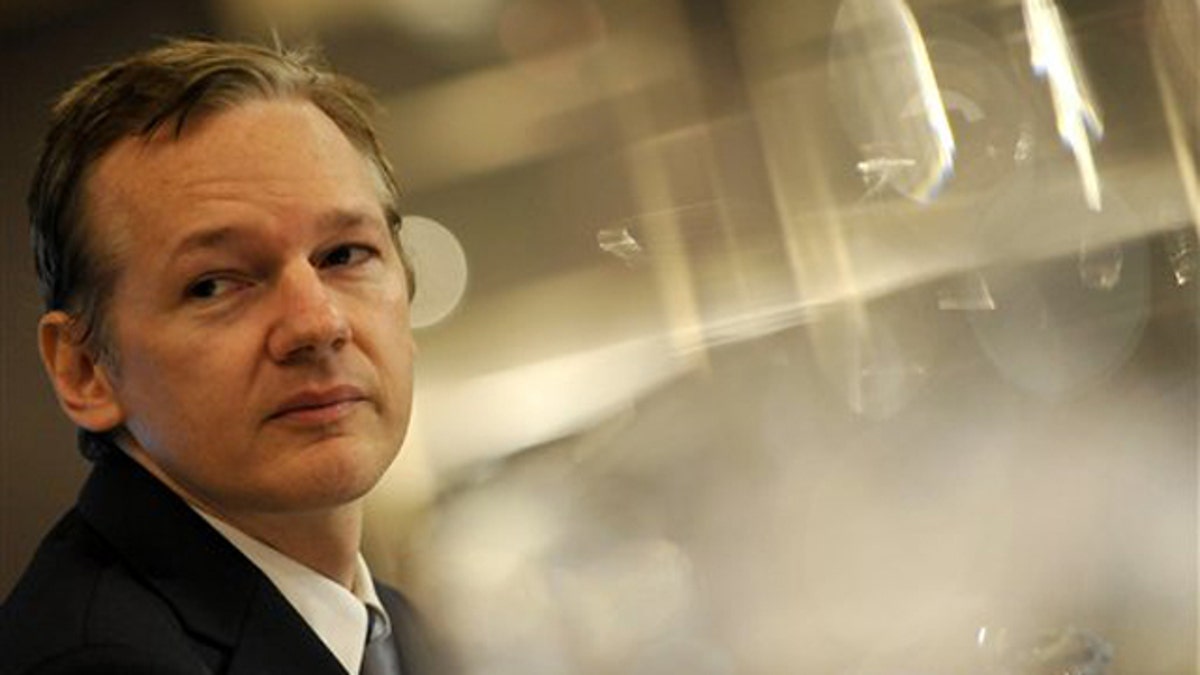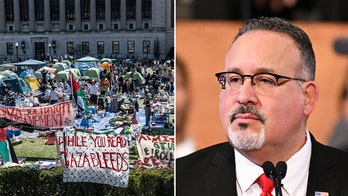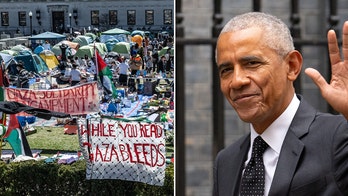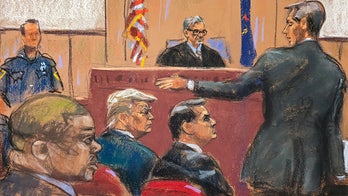
In this Oct. 23 file photo, WikiLeaks founder Julian Assange speaks during a press conference in London. (AP Photo)
Warning that the latest document leak by WikiLeaks has damaged national security, the White House on Monday ordered departments across the federal government to review their procedures for safeguarding classified information.
The director of the Office of Management and Budget, Jacob Lew, took the first step in addressing concerns that the massive leak of thousands of State Department documents constitutes a government failure to contain its own secret files. In a memo to department and agency heads, he said such a failure is "unacceptable and will not be tolerated." Lew ordered all agencies dealing with classified information to put together a "security assessment team" to review how they protect it.
"Such review should include (without limitation) evaluation of the agency's configuration of classified government systems to ensure that users do not have broader access than is necessary to do their jobs effectively, as well as implementation of restrictions on usage of, and removable media capabilities from, classified government computer networks," he wrote.
The documents aired in uncomfortable detail the conversations and dispatches behind U.S. diplomacy. Publication of the secret memos and documents Sunday amplified widespread global alarm about Iran's nuclear ambitions. It also unveiled occasional U.S. pressure tactics aimed at hot spots in Afghanistan, Pakistan and North Korea. The leaks disclosed bluntly candid impressions from both diplomats and other world leaders about America's allies and foes.
It was, said Italian Foreign Minister Franco Frattini, the "Sept. 11 of world diplomacy."
In the wake of the massive document dump, Secretary of State Hillary Clinton was expected to address the diplomatic repercussions later Monday. Clinton may have to confront the fallout firsthand after she leaves Washington on a four-nation tour of Central Asia and the Middle East -- a region that figures prominently in the leaked documents.
Rep. Pete Hoekstra, R-Mich., ranking Republican on the House intelligence committee, called the leak a "massive failure" with respect to the intelligence community.
"This database should never have been created. Hundreds of thousands of people should not have been provided access to it. This is a colossal failure by our intel community, by our Department of Defense to keep classified information secret," he said on ABC News.
Pentagon spokesman Bryan Whitman, in an e-mail sent out Sunday, said several recommendations are under review to clamp down on future security breaches.
Among them, Whitman said, are directives to limit the ability of personnel to move classified data to "unclassified systems;" to make sure two people at a time are responsible for moving such data to unclassified systems; and develop better procedures to detect suspicious behavior.
The encrypted e-mails and other documents unearthed new revelations about long-simmering nuclear trouble spots, detailing U.S., Israeli and Arab world fears of Iran's growing nuclear program, American concerns about Pakistan's atomic arsenal and U.S. discussions about a united Korean peninsula as a long-term solution to North Korean aggression.
In Australia, WikiLeaks founder Julian Assange's home country, Attorney General Robert McClelland said law enforcement officials were investigating whether WikiLeaks broke any laws.
At Clinton's first stop in Astana, Kazakhstan, she will be attending a summit of officials from the Organization for Security and Cooperation in Europe, a diplomatic grouping that includes many officials from countries cited in the leaked cables.
The documents published by The New York Times, France's Le Monde, Britain's Guardian newspaper, German magazine Der Spiegel and others laid out the behind-the-scenes conduct of Washington's international relations, shrouded in public by platitudes, smiles and handshakes at photo sessions among senior officials.
The White House immediately condemned the release of the WikiLeaks documents, saying "such disclosures put at risk our diplomats, intelligence professionals and people around the world who come to the United States for assistance in promoting democracy and open government."
U.S. officials may also have to mend fences after revelations that they gathered personal information on other diplomats. The leaks cited American memos encouraging U.S. diplomats at the United Nations to collect detailed data about the U.N. secretary general, his team and foreign diplomats -- going beyond what is considered the normal run of information-gathering expected in diplomatic circles.
State Department spokesman P.J. Crowley played down the diplomatic spying allegations. "Our diplomats are just that, diplomats," he said. "They collect information that shapes our policies and actions. This is what diplomats, from our country and other countries, have done for hundreds of years."
Assange claimed the administration was trying to cover up alleged evidence of serious "human rights abuse and other criminal behavior" by the U.S. government.
WikiLeaks posted the documents just hours after it claimed its website had been hit by a cyberattack that made the site inaccessible for much of the day.
But extracts of the more than 250,000 documents posted online by news outlets that had been given advance copies of the documents showed deep U.S. concerns about Iranian and North Korean nuclear programs along with fears about regime collapse in Pyongyang.
The Guardian said some cables showed King Abdullah of Saudi Arabia repeatedly urging the United States to attack Iran to destroy its nuclear program. The newspaper also said officials in Jordan and Bahrain have openly called for Iran's nuclear program to be stopped by any means and that leaders of Saudi Arabia, the United Arab Emirates and Egypt referred to Iran "as 'evil,' an 'existential threat' and a power that 'is going to take us to war,"' The Guardian said.
The Times also cited diplomatic messages describing unsuccessful U.S. efforts to prod Pakistani officials to remove highly enriched uranium from a reactor out of fear that the material could be used to make an illicit atomic device. And the newspaper cited exchanges showing Yemen's president, Ali Abdullah Saleh, telling Gen. David Petraeus that his country would pretend that American missile strikes against a local Al Qaeda group had come from Yemen's forces.
The paper also cited documents showing the U.S. used hardline tactics to win approval from countries to accept freed detainees from Guantanamo Bay. It said Slovenia was told to take a prisoner if its president wanted to meet with President Barack Obama and said the Pacific island of Kiribati was offered millions of dollars to take in a group of detainees.
Le Monde said another memo asked U.S. diplomats to collect basic contact information about U.N. officials that included Internet passwords, credit card numbers and frequent flyer numbers.
They were asked to obtain fingerprints, ID photos, DNA and iris scans of people of interest to the United States, Le Monde said.
The Times said another batch of documents raised questions about Italian Prime Minister Silvio Berlusconi and his relationship with Russian Prime Minister Vladimir Putin. One cable said Berlusconi "appears increasingly to be the mouthpiece of Putin" in Europe, the Times reported.
Der Spiegel reported that the documents portrayed German Chancellor Angela Merkel and Foreign Minister Guido Westerwelle in unflattering terms. It said American diplomats saw Merkel as risk-averse and Westerwelle as largely powerless.
Libyan leader Muammar al-Qaddafi, meanwhile, was described as erratic and in the near constant company of a Ukrainian nurse who was described in one cable as "a voluptuous blonde," according to the Times.
The State Department's top lawyer warned Assange late Saturday that lives and military operations would be put at risk if the cables were released. Legal adviser Harold Koh said WikiLeaks would be breaking the law if it went ahead. He also rejected a request from Assange to cooperate in removing sensitive details from the documents.
The Associated Press contributed to this report.




